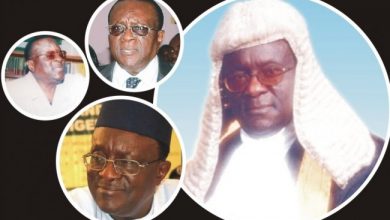
OGUN ASSEMBLY EXPLORING OVERSIGHT TO PROMOTE GOOD GOVERNANCE

According to the Sections 128 and 129 of the Federal Republic of Nigeria, as amended: “Subject to the provisions of this Constitution, a House of Assembly shall have power by resolution published in its journal or in the Office Gazette of the Government of the State to direct or cause to be directed an inquiry or investigation into – (a) any matter or thing with respect to which it has power to make laws; and (b) the conduct of affairs of any person, authority, ministry or government department charged, or intended to be charged, with the duty of or responsibility for -(i) executing or administering laws enacted by that House of Assembly, and (ii) disbursing or administering moneys appropriated or to be appropriated by such House. (2) The powers conferred on a House of Assembly under the provisions of this section are exercisable only for the purpose of enabling the House to – (a) make laws with respect to any matter within its legislative competence and correct any defects in existing laws; and (b) expose corruption, inefficiency of waste in the execution or administration of laws within its legislative competence and in the disbursement or administration of funds appropriated by it.”
In view of the forgoing, we need to acknowledge that the essence of mutual interdependence among all arms of government is to ensure check and balances and ensure strict adherence to democratic ideals in a Federal system of government, where democratic system operates, the institutional arrangement is reflected in the distribution of governmental powers amongst the three arms of government (i.e Executive, the Legislature and Judiciary). In summary, the principles that guide their operations include autonomy, separation of powers and checks and balances which are on the basis of the performance and interaction of these arms of government that good governance is determined.
Due to the peculiarity of democracy as being run in the developing democracies especially in Africa with particular reference to Nigeria, where in the past, legislative and executive policies, programmes and laws made by the Legislature were not often efficiently and effectively implemented by the executive, hence further legislative interventions became necessary to implement laws passed by the Legislature, with mechanism to check and correct problems whenever the need arose. Therefore, oversight of executive programmes and activities becomes very essential to promote good governance at all levels of government.
It is pertinent to state that at the national level, the House oversight activities shall leverage on the constitutionally mandated power of investigation by the National Assembly under Sections 88 and 89 of the constitution to expose corruption, inefficiency and waste in the conduct of government business. The same power is granted to the State Houses of Assembly under Sections 128 and 129 as earlier stated.
The purposes of such oversight is to ensure that the House has the necessary political will and capacity to ensure unhindered oversight of the executive arm to promote accountability, reduce incompetence, misuse of government fund and ensure value for money, promote quality and avoid waste. Also, the House where necessary, institutes an appropriate system to involve Civil Society Organisations (CSOs), citizen monitoring groups and the media in its oversight and monitoring as well as evaluation of projects.
However, in carrying out its oversight activities, the House has a responsibility towards ensuring that such oversight and investigative activities are not misused or abused by any of the House committee members. Consequently, the legislative arm shall continue to strengthen its processes through rules and other internal structures to support its financial information with effective measures to sanction those who do not cooperate with its oversight activities or the implementation of legislative resolutions.
In its oversight function, the House has the responsibility to exercise its constitutional powers, financial, human and political resources to carry out its legislative responsibilities.
As a vital organ in a democratic setting, the House of Assembly through the instrument of oversight continues to play a vital role in the promotion of good governance by meeting the yearnings of the people in terms of development initiatives and welfare programme. Such legislative tool is meant to aid good governance through institutional and structural arrangements, decision making process, policy formulation and implementation, capacity development of person, information flows from constituents and the nature as well as style of leadership within a political environment.
In other words, the basic processes of oversight are tools deployed by the legislature to carry out and enforce their oversight functions. They include Committee investigation, public hearings, personal explanation/public petitions as presented at plenary sittings as well as Legislative committees. They may call for reports and explanations from government Ministries, Departments and Agencies as well as Local Government Councils and Local Councils Development Areas (LCDAs) where necessary.
No doubt that the legislative arm in the country guards its independence jealously, but in its wisdom, it is cautious of the fact that government is one and united entity, hence, cooperation rather than confrontation with the other branches, particularly the executive helps build a workable government framework. It is worthy of note that the nation’s constitution was designed in such a way that the legislature maintains checks and balances with the executive and vice versa. This feature helps to protect the liberty and prevent authoritarianism/ dictatorship. Therefore, the doctrine of separation of power is not only to promote efficiency, but to prelude the exercise of arbitrary power or save the people from autocracy.
Notwithstanding the challenges being faced by legislative arm in carrying out its oversight within the nation’s political sphere which range from executive interference, inordinate ambition of some lawmakers and leadership of some legislative Houses, raising of false alarm to score cheap political blackmail and other selfish interest, the power of the legislature to review, monitor and supervise government agencies, programmes, activities and policy implementation strategies of the executive arm of government remain sacrosanct. This is as important as the democracy itself because the utmost beneficiary of the process is the people.
A clear instance is reflected in the oversight of government Ministries Department and Agencies, (MDAs) including the Local Government Councils as well as Local Council Development Areas carried out by the Ogun State House of Assembly in the outgone year. The result of such important legislative assignment indicated that aside from the exchange of ideas on shared value towards promoting good governance through budget implementation assessment, there were interactions or applauds, where necessary on the promotion of prudency, accountability and transparency. Welfare programmes for the populace, promotion of agricultural practice and food security, valuable advice on how to ensure improved revenue generation for grassroot development, provision of infrastructure at the local government level, project balancing as well as the overall development of rural areas in the State were also parts of the fallouts of the interactions.
The House of Assembly in specific terms sought the need for the Local Government Councils (LG) and Local Council Development Areas (LCDAs) in the State to complement the ongoing developmental programmes of the Senator Ibikunle Amosun led government at the grassroot level in the State by investing in profitable ventures, implementation of more on infrastructural projects thereby creating enabling environment for the enhancement of socio-economic development of their council areas.
The State lawmakers during their oversight to the LGs and LCDAs underscored the need for the Chairmen to contribute their quota to the socio-economic development of their areas, while acknowledging their ingenuity in the promotion of agricultural practices, revenue generation initiatives and grading of rural roads amongst others.
The House Committee on Local Government and Chieftaincy Affairs charged the chairmen on the need to develop a blueprint that would assist the LGs and LCDAs in improving the standard of living of the people and equally boost the revenue drive for the implementation of more people-oriented programmes in their council areas.
Also, the House through its Committee on education, Science and Technology during the last oversight enjoined the Managements of higher institutions in the State to continue to evolve more strategies for the promotion of quality higher education for the educational and technological advancement of the state and the nation.
The House Committee noted that higher institutions provided skills for human resources development and industrial productivity through various technologically driven programmes, while commending them for their financial ingenuity and uninterrupted academic calendar as well as the implementation of capital projects for the enhancement of teaching and learning in the schools.
To this end, the Legislative arm remains the most notable symbol of democracy with clear role to make, amend and repel law for the good and general wellbeing of the society while serving as a watch dog over activities of government. Thus, it can be inferred that the power of the legislature in performing its constitutional role by giving direction and visionary leadership determines to a large extent the success of the entire system of government. Therefore, any hindrance to the functions and power of the legislature indirectly affects good governance.
It is important to acknowledge that the State House of Assembly has consistently make use of its oversight function to promote checks and balance, instill fiscal discipline and responsibility, sustain good governance, aid accountability and transparency. It has equally to improve efficiency and effectiveness in government operations, economic growth, evaluation of policy and programme performance, prevent waste or abuse, arbitrary or illegal and unconstitutional conduct.
It has also helped in sensitizing the general public and ensured that government policies reflect the public interest; harnessing input from the members of the public to develop new legislative proposals /bills. One cannot but conclude that the success of any Legislative oversight and by extension the entire functions of the Legislative branch of government are dependent on strong commitment to integrity, ethical values, the rule of law and openness and the overall stakeholders’ engagements.
Lawal Abiodun Jamiu writes from the Information Department, Ogun State House of Assembly.





